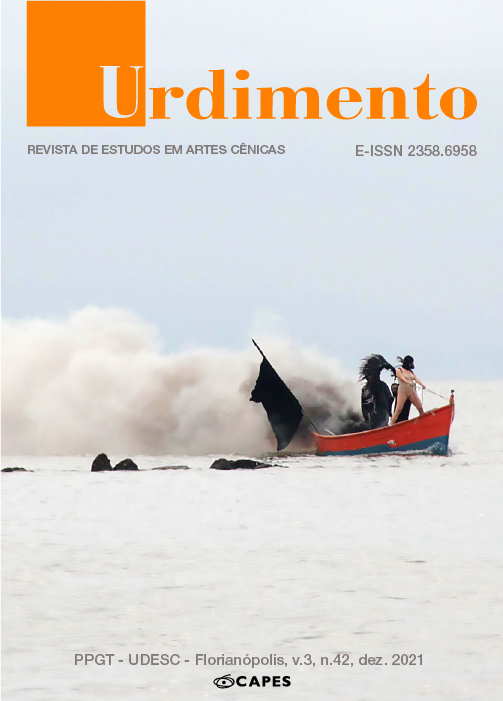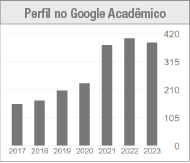Creative processes in laboratory: the production of intimacy in the disruptive territory of virtual gatherings
DOI:
https://doi.org/10.5965/1414573103422021e0118Keywords:
Autofiction, Biopotency, DecolonizationAbstract
Biographical/autofictional processes teach us to face the devices of biopolitical control over our immaterial production, especially the affections. These narratives of intimacy are a radiant invitation for the subject´s radical reinvention, for the remake of the affection map and the confrontation of intimidating “realities”. Can this promise of intervention and emancipation pointed out with narratives of intimacy still work in a virtual territory? Can the decolonization, demercantilization, and deprivatization of bodies be performed in a remote artistic practice? Where is the interaction between bodies impossible? How to produce bipotent bodies in the disruptive territory of virtual gatherings? This is the reflection proposed by this article.
Downloads
References
ARTAUD, Antonin. O teatro e seu duplo. São Paulo: Martins Fontes, 1993.
ARTAUD, Antonin. Ouevres complètes, tomo XV. Cahiers de Rodez. Paris: Gallimard, 1981.
BADIOU, Alain. Em busca do real perdido. Belo Horizonte: Autêntica Editora, 2017.
BARBA, Eugenio. A Canoa de Papel. Brasília: Ed. Dulcina, 2009.
CLARK, Lygia. A propósito da magia do objeto, 1965. Estamos domesticados?, 1964. In: Associação cultural Mundo de Lygia.
COMITÊ INVISÍVEL. Aos nossos amigos. Crise e Insurreição. São Paulo: n-1 edições, 2016.
CORNÁGO, Óscar. Atuar de “Verdade”. A Confissão Como Estratégia Cênica. Urdimento – Revista de Estudo em Artes Cênicas, Florianópolis, v.2, n.13, p.099-111, 2018. Disponível em:
https://www.revistas.udesc.br/index.php/urdimento/article/view/1414573102132009099. Acesso em: 20 abr. 2020.
CORNÁGO, Óscar. Biodrama: Sobre el teatro de la vida y la vida del teatro. Latin America Theatre Review: Kansas, v.39, n.01, p.05-28, 2005. Disponível em: https://journals.ku.edu/latr/article/view/1515. Acesso em: 10 jan. 2019.
DELEUZE, Gilles. Nietzsche e a filosofia. Rio de Janeiro: Semeion, 1976.
DELEUZE, PARNET. Diálogos. São Paulo: Editora Escuta, 1998.
DERRIDA, Jacques. A escritura e a diferença. São Paulo: Perspectiva, 1971.
DUBATTI, Jorge. O teatro dos mortos, introdução a uma filosofia do teatro. São Paulo: SESC, 2016.
FERAL, Josette. Teatro, teoria y páctica: más allá de las fronteras. Galerna: Buenos Aires, 2004.
FERNANDES, Sílvia. Teatralidades Contemporâneas. São Paulo: Perspectiva, 2010.
FOUCAULT, Michel. O corpo utópico, as heterotopias. São Paulo: N-1 edições, 2013.
GIL, José. Em busca da identidade, o desnorte. Lisboa: Relógio D’água, 2009.
GIL, José. O Corpo Paradoxal. In_ Movimento total. Lisboa: Relógio D’água: 2001.
GROTOWSKI, Jerzy. O performer. Tradução de Celina Sodré. Conferência pronunciada por Grotowski e publicada pela Art-Press em 1987. Texto original em francês traduzido por Celina Sodré (sem publicação). Acesso em: 2013, compartilhamento de uma das alunas do Instituto do ator.
LINS, Sonia. Artes, 1996. Disponível em http://www.sonialins.com.br/ pdf/artes.pdf. Acesso em: 20 jan. 2021.
LISPECTOR, Clarice. A paixão segundo GH. Rio de Janeiro: Rocco, 1998.
LEHMANN, Hans-Thies. Teatro pós-dramático. São Paulo: Cosac & Naify, 2007.
MARINIS, Marco. Capire il teatro, lineamenti di una nuova teatrologia. Firenze: Bulzoni, 1999.
PELBART, Peter Pál. Biopolítica. Sala Preta. São Paulo: USP, V. 7, s/n, p.57-66, 2007. Disponível em: https://www.revistas.usp.br/salapreta/article/view/57320.
Acesso em: 10 abr. 2020
RANCIÈRE, Jacques. O destino das imagens. Rio de Janeiro: Contraponto, 2012.
RIBEIRO, Martha. O treinamento do ator no laboratório de criação e investigação da cena contemporânea: a respiração como escultura de afetos. Revista Pitágoras 500, Campinas, v.9, n.1, p. 132-144, 2019. Disponível em: https://periodicos.sbu.unicamp.br/ojs/index.php/pit500/article/view/8655510. Acesso em: 27 maio 2019.
RIBEIRO, Martha. Teatros do real e a abertura da representação. Urdimento – Revista de Estudos em Artes Cênicas, Florianópolis, v. 1, n. 37, p. 344-355, 2020. Disponível em: https://www.revistas.udesc.br/index.php/urdimento/article/view/1414573101372020344. Acesso em: 17 abr. 2020
ROLNIK, Suely. Esquizoanálise e Antropofagia. Texto apresentado no colóquio Encontros Internacionais Gilles Deleuze. Brasil, 1996. Disponível em: http://www4.pucsp.br/nucleodesubjetividade/Textos/SUELY/Antropesquizoan.pdf. Acesso em: 10 março, 2019.
ROLNIK, Suely. Esferas da insurreição. Notas para uma vida não cafetinada. São Paulo: n-1 edições, 2018.
ROLNIK, Suely. Por um estado de arte a atualidade de Lygia Clark. In: Núcleo Histórico: Antropofagia e Histórias de Canibalismos, São Paulo: Fundação Bienal de São Paulo, 1998.
ROLNIK, Suely. Lygia Clark, da obra ao acontecimento (Catálogo de exposição). São Paulo: Pinacoteca de São Paulo, 2006.
ROLNIK, Suely. Lygia Clark e o híbrido arte/clínica. Disponível em http://caosmose.net/suelyrolnik/
ROLNIK, Suely. O corpo vibrátil de Lygia Clark. In: Caderno Mais, Folha de São Paulo. São Paulo. Abril, 2000.
Downloads
Published
How to Cite
Issue
Section
License
Copyright (c) 2021 Urdimento - Revista de Estudos em Artes Cênicas

This work is licensed under a Creative Commons Attribution 4.0 International License.
Copyright Statement
The articles published by the magazine are free to use. The copyright is all assigned to the magazine. The articles whose authors are identified represent the expression from the point of view of their authors and not the official position of the journal Urdimento. The author (s) undertakes whenever publishing material relating to the article published in Revista Urdimento mention the said publication as follows: This article was originally published by Urdimento magazine in its volume (put the volume), number (put the number) in the year of (put the year) and can be accessed at:
http://www.revistas.udesc.br/index.php/urdimento
This work is licensed under a Creative Commons Attribution 4.0 International License.




